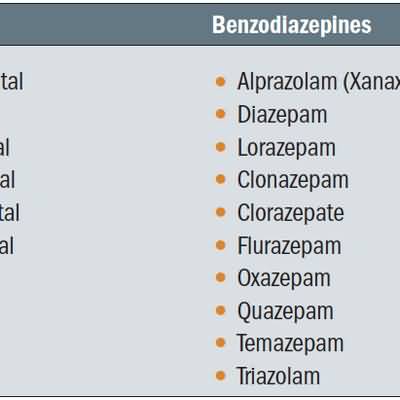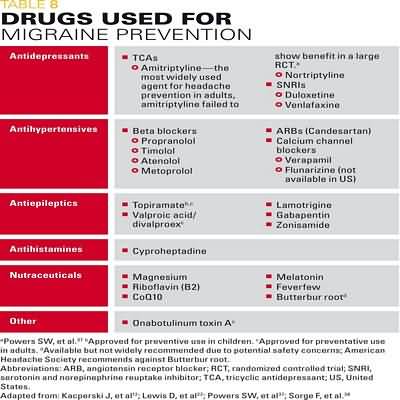Barbiturates
Barbiturates
Barbiturates act as sedatives, hypnotics, and antiepileptics. They are general CNS depres sants. Barbiturates inhibit impulse conduc tion in the ascending reticular activating sys tem, depress the cerebral cortex, alter cerebellar function, depress motor output, and can pro duce excitation, sedation, hypnosis, anesthe sia, and deep coma; at anesthetic doses, they have anticonvulsant activity.
Indications
Sedatives or hypnotics for shortterm treat ment of insomnia Preanesthetic medications Antiepileptics, in anesthetic doses, for emer gency control of certain acute seizure epi sodes (eg, status epilepticus, eclampsia, meningitis, tetanus, toxic reactions to strych nine or local anesthetics) Contraindications and cautions
Contraindicated with hypersensitivity to bar biturates, manifest or latent porphyria, marked hepatic impairment, nephritis, se vere respiratory distress, respiratory disease with dyspnea, obstruction, or cor pulmonale, previous addiction to sedativehypnotic drugs, pregnancy (causes fetal damage, neonatal withdrawal syndrome), or lactation. Use cautiously with acute or chronic pain (paradoxical excitement or masking of im portant symptoms could result), seizure dis orders (abrupt discontinuation of daily dos es of drug can result in status epilepticus), fever, hyperthyroidism, diabetes mellitus, se vere anemia, pulmonary or cardiac disease, status asthmaticus, shock, uremia. Adverse effects
CNS: Somnolence, agitation, confusion, hyperkinesia, ataxia, vertigo, CNS de pression, nightmares, lethargy, residual sedation (hangover), paradoxical excite ment, nervousness, psychiatric distur bance, hallucinations, insomnia, anxi ety, dizziness, abnormal thinking CV: Bradycardia, hypotension, syncope GI: Nausea, vomiting, constipation, di arrhea, epigastric pain Hypersensitivity: Skin rashes, angio neurotic edema, serum sickness, morbilli form rash, urticaria; rarely, exfoliative der matitis, StevensJohnson syndrome Local: Pain, tissue necrosis at injection site, gangrene; arterial spasm with inad vertent intraarterial injection; thrombo phlebitis; permanent neurologic deficit if injected near a nerve Respiratory: Hypoventilation, apnea, respiratory depression, laryngospasm, bronchospasm,circulatory collapse Other: Tolerance, psychological and phys ical dependence; withdrawal syndrome Interactions
Drugdrug Increased CNS depression with alcohol Decreased effects of the following drugs given with barbiturates: oral anticoagulants, corticosteroids, oral contraceptives and estro gens, betaadrenergic blockers (especially propranolol, metoprolol), theophylline, metron idazole, doxycycline, phenylbutazones, quini dine Nursing considerations
Assessment
History: Hypersensitivity to barbiturates, manifest or latent porphyria; marked hepatic impairment; nephritis; severe respiratory dis tress; respiratory disease with dyspnea, ob struction, or cor pulmonale; previous ad diction to sedativehypnotic drugs; acute or chronic pain; seizure disorders; pregnancy; lactation; fever, hyperthyroidism; diabetes mellitus; severe anemia; pulmonary or cardiac disease; status asthmaticus; shock; uremia Physical: Weight; T; skin color, lesions, in jection site; orientation, affect, reflexes; P, BP, orthostatic BP; R, adventitious sounds; bowel sounds, normal output, liver evalua tion; LFTs, renal function tests, blood and urine glucose, BUN Interventions
Do not administer intraarterially; may pro duce arteriospasm, thrombosis, gangrene. Administer IV doses slowly. Administer IM doses deep in a muscle mass. Barbiturates 32 ? Barbiturates Adverse effects
in italics are most common; those in bold are lifethreatening. U Do not crush. Do not use parenteral dosage forms if solu tion is discolored or contains a precipitate. Monitor injection sites carefully for irrita tion, extravasation (IV); solutions are alka line and very irritating to the tissues. Monitor P, BP, R carefully during IV ad ministration. Keep resuscitative facilities available in case of respiratory depression, hypersensitivity re action. Provide frequent small meals, frequent mouth care if GI effects occur. Use safety precautions if CNS changes oc cur (use side rails, accompany patient). Provide skin care if dermatologic effects oc cur. Provide comfort measures, reassurance for patients receiving pentobarbital for tetanus, toxic seizures. Offer support and encouragement to patients receiving this drug for preanesthetic med ication. Taper dosage gradually after repeated use, especially in patients with epilepsy. Teaching points
When giving these drugs as preanesthetic, in corporate teaching about the drug into gen eral teaching about the procedure. Include these points: This drug will make you drowsy and less anxious. Do not try to get up after you have received this drug (request assistance if you must sit up or move about for any reason). Outpatients Take these drugs exactly as prescribed. These drugs are habit forming; the drug’s effective ness in facilitating sleep disappears after a short time. Do not take these drugs longer than 2 weeks (for insomnia), and do not in crease the dosage without consulting your health care provider. If the drug appears to be ineffective, consult your health care provider. Avoid becoming pregnant while taking these drugs. The use of hormonal contraceptives while taking these drugs is not recom mended as the contraceptives lose their ef fectiveness. You may experience these side effects: Drowsiness, dizziness, hangover, impaired thinking (these effects may become less pro nounced after a few days; avoid driving a car or engaging in activities that require alertness); GI upset (taking the drug with food may help); dreams, nightmares, diffi culty concentrating, fatigue, nervousness (these are effects of the drug that will go away when the drug is discontinued; con sult your health care provider if these be come bothersome). Report severe dizziness, weakness, drowsi ness that persists, rash or skin lesions, preg nancy. Representative drugs
amobarbital methohexital pentobarbital pentobarbital sodium phenobarbital primidone secobarbital thiopental

















